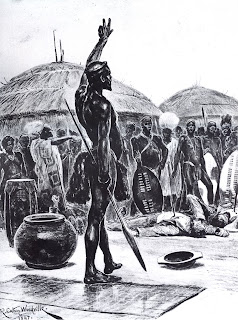Bulalani Abathakathi & Hakuna Matata
We are all insignificant. Perhaps there is no other axiom which is so easily forgotten, overlooked and trashed as this. In this massive universe of ours (is it ours?), we live on a solar system which is like millions of others. There is nothing remarkable about this solar system other than of course that we live on it! And while that may give it some importance that is all it has because neither by size nor by any other astronomical parameter our (is it ours?) puny solar system is other than mediocre. Our sun may be called as a mid sized star, if one is being charitable. It is well past its middle age and unbeknownst to us might be undergoing a mid life crisis, that is if stars also have human like frailties.
Which brings us to humans. Humans are frail. Their physical capabilities are completely unremarkable. They are not the fastest, strongest or tallest of any of the species currently inhabiting the weird planet earth. Yes, while it may be insignificant, Earth is distinctly weird. Some prefer to call it unique but weird is more apt. This frail and unremarkable species inhabiting this weird planet orbiting a mid sized star in a mediocre solar system is us. While we may like to think our life span as tortuous and lamentable it certainly is not long. What is perhaps significant is that in this short lifespan of ours we manage to upset our ecosystem to a degree that it hinges precariously for its existence. Not that the universe cares. Or if even the Earth cares - in its not so short life span it has seen at least four mass extinction events. If Earth had thoughts and feelings, it might be rejoicing at the choices that humans are making plausibly taking it to the fifth complete annihilation event. As a planet in its midlife it is like ‘yesterday once more” for Earth.
In the interim, we try to amuse ourselves with make believe myths disguised as serious and deep philosophy, religion, ideology and humanity. We squabble with those who do not agree with us. We go to war only for later historians to debate their insurmountable casus belli. We imagine slights and exaggerate them so as to make fragile kinships to gang up against fellow humans whom we perceive to be enemies. We trick, trap and kill in the name of honour and patriotism. And then we shout, “Bulalani abathakathi” (“Kill the witches!”)!
Seventeenth century onwards the Europeans gradually began colonising the great continent of Africa. They made very slow headway. In Southern Africa, there were multiple waves of Europeans of different nationalities that led to conflicts not only between the African natives and the European settlers but also among the colonialists. This internecine conflict led to displacements and prompted the agriculturalists of primarily Dutch descent (“Boers”) to undertake a long trek to escape the clutches of the British authorities in the Cape Colony. These boers were called “Voortrekkers” or pioneers who went to hitherto unexplored areas inland. They ventured in the territory of the Zulu kingdom and tried to negotiate with their king, Dingane, to grant them owner ship of land, a concept which was alien to Zulus. Some versions describe the veiled threats used by the Voortrekkers to forcibly take land from the Zulus. Others show them as poor victims. What happened next is unclear. It is said that the Zulu king, Dingane, uttered, “Bulalani abathakathi” to rouse his warriors to kill the Voortrekker delegation. It has been translated simply as, “Kill the witches” or “Kill the magicians” or in a more elaborate translation as, “Kill the doctors who dispense medicines to kill”. This massacre led to a wave of reprisals and counter - reprisals leading to the Battle of the Blood River that resulted in a victory for the vastly outnumbered Voortrekkers over the Zulus. The memory of this event was celebrated in the Apartheid South Africa as the “Day of the Covenant”.
There is no evidence that Dingane actually spoke those words. The motives of Dingane to murder an unarmed delegation has been debated by historians of various motivations and political affiliations and the truth of the event has been lost in the repeated muddles of the academic investigation. Whatever may be the truth, the one thing apparent to me from “Bulalani abathakathi” is that we easily forget our apparent insignificance and pander to our insecurities of identity, kinship, religion and race to wage war and kill fellow humans.
I can only dare to fantasise what could have happened, if Dingane had shouted, “Hakuna Matata!” (“There are no worries here!”) instead of “Bulalani abathakathi”. Would history have been different? Would it have led to peaceful coexistence? No one can say. Only that the ever expanding universe would have continued to spin away meaninglessly without a care!


Comments